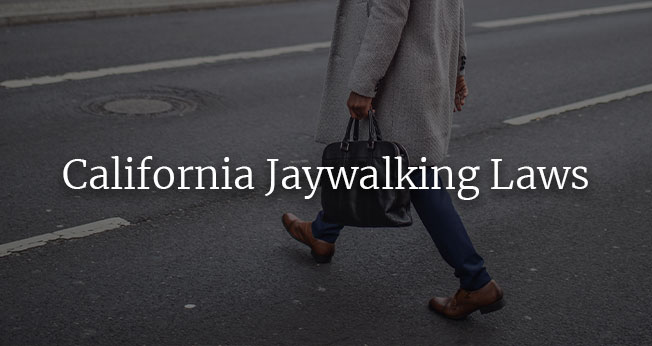Jaywalking Laws in California
Jaywalking refers to when a pedestrian crosses the road where there is no crosswalk or marked intersection. Jaywalking is a dangerous – and generally illegal – practice that causes thousands of accidents and injuries each year. In San Diego, traffic accidents killed and injured 706 pedestrians in 2015. Eighty-eight (88) of these pedestrians were children under the age of 15. Jaywalking can put pedestrians at risk of serious accidents. Learn the laws in California to keep yourself safe while walking in California. If you lost a loved one in an accident, speak to a San Diego pedestrian accident attorney to review your options.

What Constitutes Jaywalking?
California Vehicle Code 21955 contains the state’s main jaywalking law. It states “pedestrians shall not cross the roadway at any place between adjacent controlled intersections except in a crosswalk.” Controlled intersections have either traffic control signals or police officers directing traffic. Another state vehicle code makes it unlawful for pedestrians to walk in the road at places other than close to the left-hand edge of the roadway. In general, someone is jaywalking in California if that person crosses a street when and where he/she is not legally supposed to.
Is It Ever Okay to Jaywalk?
In some circumstances, it is okay to jaywalk, as long as a pedestrian does so carefully and cautiously. Code 21954(a) states that if a pedestrian must cross somewhere other than a crosswalk or intersection, that person must yield the right-of-way to all vehicles that are near enough to present an immediate hazard. In other words, a pedestrian does not have the right to step out in front of an oncoming vehicle (even if that vehicle has enough time to stop) while jaywalking. The only time a pedestrian can step from a curb is if he or she is at a crosswalk or marked intersection and obeying traffic control signals.
If a crosswalk or intersection is available in the vicinity, police might give a pedestrian a ticket for jaywalking in California. A pedestrian might also receive a citation if he or she crosses the road without the right-of-way, even if the pedestrian crossed at an intersection or crosswalk. Jaywalking is generally not a crime that will lead to an arrest, which is why one video of a Sacramento police officer reacting questionably to a jaywalker has gone viral.
The video shows an officer throwing a man down and repeatedly striking him in the face – apparently for jaywalking near Cypress Street and Grand Avenue. The Sacramento Police Department decried the actions of the officer and said the conduct was “unacceptable.” If the man in the video was in fact only guilty of jaywalking, the officer should have issued a fine, at most – and then only if the man crossed unlawfully.
What If a Car Strikes Me While I’m Jaywalking?
California is a pure comparative negligence state. Comparative negligence refers to an injured party’s (plaintiff’s) share of fault for a pedestrian accident. In a pure comparative negligence state, a plaintiff can still recover financial compensation if his or her negligence is partially to blame for the injuries. To have a comparative negligence defense, the defendant must prove that the plaintiff was negligent and that this negligence was a substantial factor causing the harm. This defense could affect your accident claim if you were jaywalking at the time of the collision.
Since jaywalking is against the law in California, a pedestrian guilty of it could take at least some of the blame for his/her injuries. Even if the courts find a plaintiff 99% at fault for jaywalking, however, the plaintiff could still receive 1% of a compensation award in California. It will be up to you (and your attorney) to minimize your percentage of fault and maximize the defendant’s. Jaywalking alone may not bar you from recovery if you can prove that the defendant was also negligent and contributed to the cause. Talk to a personal injury attorney in San Diego for more information. We also Temecula personal injury lawyers as well as Escondido injury attorneys ready to take your case. Call us today for a free consultation.

